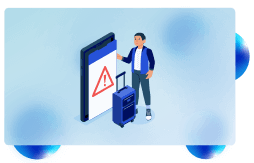Travel fraud is a growing concern within the industry, posing significant challenges to businesses and consumers alike. As travel becomes increasingly digital, the opportunities for fraudsters to exploit online transactions and reservations have also expanded. Research from global Edgar, Dunn & Company, on behalf of eNett, said in total, fraud costs the travel industry over $21 billion dollars annually, including $6 billion dollars in damages and $15 billion in overheads.
This blog delves into the nature of travel fraud, the difficulties it presents to the travel industry, and explores how implementing Know Your Customer (KYC) processes can serve as an effective countermeasure.
Understanding Travel Fraud
Travel fraud encompasses a variety of deceptive practices aimed at stealing money or personal information from individuals or companies. This can range from the creation of fake travel deals and phishing emails to steal personal data, to the use of stolen credit cards to purchase flights or accommodations. The consequences are not only financial losses but also damage to the reputation of businesses and a decrease in consumer trust.
Challenges of Travel Fraud Across Airlines, Car Rentals, and Hotels
Each segment of the travel industry—airlines, car rentals, and hotels—faces unique challenges related to travel fraud, impacting their operations and customer trust significantly. Here’s a detailed exploration of these challenges:
Airlines
- Credit Card Fraud: This is prevalent due to the high volume and value of transactions. Fraudsters use stolen credit card details to purchase tickets, which are then often sold on the black market.
- Loyalty Program Fraud: Scammers target airline loyalty programs to steal points, which can be used to purchase flights or upgraded services.
- Identity Theft: Using stolen identities to book flights is a significant issue, as it complicates the verification processes and can lead to wrongful blacklisting of genuine customers.
- Chargeback Fraud: After booking flights with stolen card details, fraudsters might cancel the ticket and request a chargeback, leaving the airline to cover the cost of the refund and the chargeback fee.
- Fake Ticket Scams: Fraudsters create counterfeit booking websites or send phishing emails offering unrealistically cheap fares to lure customers into paying for flights that do not exist.
Car Rentals
- Identity Theft: Similar to airlines, car rental agencies face issues with identity theft where fraudsters rent cars using stolen identities or credit card information.
- Stolen Vehicles: There’s a risk of vehicles being stolen by individuals who rent cars under false pretenses or with forged documents.
- Insurance Fraud: This occurs when renters cause damage intentionally to claim insurance. There are also scams involving exaggerated claims for minor damages.
- Fake Rental Agencies: Scammers set up bogus car rental websites or advertise on legitimate platforms with attractive rates to collect advance payments for rentals that are never provided.
Hotels
- Credit Card Fraud: Hotels often pre-authorize or charge credit cards at booking, making them a target for using stolen credit card information.
- Fake Booking Websites: Like airlines and car rentals, hotels are also plagued by fraudulent bookings made through fake websites that mimic legitimate hotel booking platforms.
- No-Show Scams: Scammers book rooms with stolen credit card details, and when the actual cardholder disputes the charge, the hotel is left with the loss.
- Loyalty Program Fraud: Fraudsters hack into customer accounts to steal loyalty points or book free rooms, similarly impacting the hotel’s revenue and customer trust.
- Advance Fee Scams: These involve fraudsters posing as hotel operators or booking agents who ask for upfront payments or deposits from unsuspecting customers for special holiday packages or guaranteed reservations that don’t exist.
What can you do?
Making sure we really know who our customers are is super important. That means implementing robust Know Your Customer (KYC) practices, checking their IDs and even using stuff like fingerprints or facial recognition (such as Face Match) to confirm their identity. When it comes to online payments, having strong security measures like two-factor authentication can really help keep things safe. IDcentral’s KYX solutions offer a comprehensive approach to combating travel fraud and making it easier for customers to get on board in the travel industry. These solutions leverage advanced AI technology and sophisticated algorithms to provide rapid, accurate identity verification and compliance with KYC/AML regulations, thus addressing some of the key challenges faced by the travel industry.
Learn more about IDcentral’s KYC solutionsBook a free demo
IDcentral is the next-generation digital identity platform, that helps businesses across various domains to increase their profitability and reduce risk. IDcentral forays Subex’s vision to expand Digital Trust business beyond its core area of interest ‘Telecom’.
